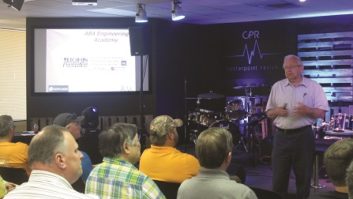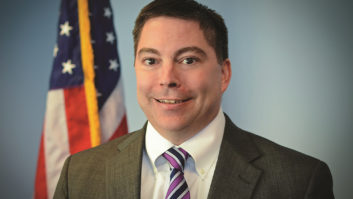When I was a kid in junior high school in the mid-1970s, I happened across a fascinating book on the shelf of the school library. It had lots of black-and-white pictures of big transmitters and antennas and microphones. The book was all about building and operating one’s own radio station. I was immediately hooked!

I checked it out and pored over its pages … only to be disappointed. It turns out I was wrong. These were no home-built broadcast stations spinning stacks of wax and beaming their voices to their neighbors’ AM radio sets. Instead, I’d accidentally stumbled across amateur radio (unfortunately, at least in my mind), not to be confused with “professional radio.”
So I couldn’t simply plop down a high power transmitter in my basement and start yakking? I had a lot to learn about radio, not the least of which is that there was a little government agency known as the FCC that might have a say in such things.
Eventually, I did pass the required exams and got my amateur radio license, and I took solace in the fact that at least I could put a signal on the air, even if the entire town couldn’t hear my prepubescent voice, and I couldn’t play my favorite records for them. As it turns out, I ultimately did have a short career in the world of broadcast radio, but that’s a story for another time.
What my accidental fall into amateur radio as a kid led to later is what I want to talk about here. Another library, another book. This time, I was in high school, and the book was an introduction to shipboard radio officers. That word — “‘radio” — again! And what do you know but my newfound hobby appeared to have a lot in common with that career?
Morse Code, check.
Transmitters, check.
Antennas, check.
And when I turned the page to see the picture of a sharp-dressed proud officer, standing on a mast pedestal and working on a radar scanner, I was sold (again). So, if I understood correctly, I could be paid to do what I enjoyed, while sailing aboard a ship and visiting exotic ports around the world? Sign me up!

A view of the main mast of the MV Mokihana, showing navigational and communications antennas, including X Band and S Band RADAR, HF Radio, VHF radio, GPS and Standard-B, C, and Mini-M satellite domes. The author can be seen waving from its top.
RADIO ELECTRONICS OFFICER
To make a long story slightly longer, 10 years after high school I did join a seagoing union, the American Radio Association, and started sailing aboard vessels of the U.S. Merchant Marine.
It’s been a long and interesting voyage. I’ve tasted the sea salt of yesterday when Morse Code was king on a medium-frequency lifeline that was the only connection with the outside world, sometimes thousands of miles away. I feel fortunate to have seen the waning days of that chapter of nearly a century of maritime wireless history.
But I’ve also witnessed a great evolution in technology aboard the vessels I’ve sailed on and great changes in my own experiences and daily routine at work to go along with it.
When I began this career, it was primarily a sedentary job, consisting of sitting in front of a large console of vacuum tubes, knobs and switches, ferreting out the subtle signals of far away ships through the static crashes of thunderstorms at sea. Nowadays, I find myself in all parts of the ship on any given day, working on everything from navigational computers to the automation that controls the main engine.
I love my job. From day to day, I never know what I may be working on, learning about and getting involved with. And I’m somewhat of a free agent on board. Depending on the need at the time, I may be working for the captain or for the chief engineer. I may be repairing a coaxial feed line to an antenna on the flying bridge in the morning and calibrating the throttle in the engine control room in the afternoon. The modern day radio electronics officer doesn’t much resemble his or her counterpart from a quarter century ago.
What an incredible ride it has been. I’ve sailed on container ships to Hawaii, surfing the beaches of Waikiki, and I’ve crewed military cargo ships supporting exercises in Thailand, where I’ve experienced the local culture and tasted the local cuisine. I may not have sailed the seven seas, but I have indeed sailed five of them. And every single day of that adventure has been filled with learning something new or seeing something for the first time.
I think my little stumble into radio as a 14-year-old kid has paid off OK.
I could have had a very satisfying career as a broadcast engineer. That’s where I was headed. But it’s funny how life sometimes deals you interesting twists and turns. I found myself instead using much of the same skill set with the added dimension of being a seafarer and traveling the world.
Now, where did I put that stack of wax?
Kelly Anderson is the president of the American Radio Association. He lives in southern Utah with his dog Radar. The ARA is currently seeking skilled electronics technicians and engineers. You can contact them at www.araunion.org or via email to [email protected].







